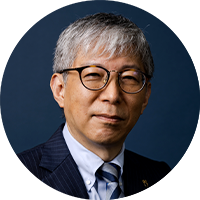Coach's VIEW is a business column authored by executive coaches in COACH A, aimed at providing valuable insights and effective approaches for leveraging coaching to foster organizational and leadership development. The column draws on the latest coaching trends and data, as well as insights from notable global publications on coaching.
Leadership Roles in an "Unexpected World"

It has been three years since people began experiencing the "unexpected world" due to COVID-19. With interpersonal contacts and our movements restricted, we experience daily that what was previously the norm is no longer the standard in the world. The word "unexpected" means "the prediction has been exceeded". From this perspective, what is "unexpected" to one person may be "within expectations" to another. The reason why COVID-19 disaster is said to be "unexpected" is because it exceeded the expectations of many people around the world.
What Does "An Unexpected World" Bring?
Now, let us rethink what we lose and what we gain when we face an "unexpected" situation ourselves.
For example, John gets up at 6:00a.m. every morning, drinks soy milk and eats a banana for breakfast. He leaves his house at 8:00 a.m. and takes his usual route to work. When he arrives at the office, he starts up his computer and checks his email first. After that, he attends a meeting on his schedule. Occasionally, he receives urgent consultations from his subordinates or clients, which may be a little unexpected to him. However, it is safe to say that John is living in a world within his expectations.
In the expected world, the world that you have already predicted will unfold. Because things proceed almost exactly as you have imagined in advance, you are likely to be able to control the situation. The feeling of "being in control of the situation," even though unconsciously, increases the probability of our own survival and gives us a sense of security. On the other hand, the more unexpected and chaotic the world is, the more difficult it becomes to understand the situation and to visualize what action to take. It makes it hard for us to have a sense of control over what we cannot visualize. As a result, one's survival probability is threatened and one becomes anxious.
People cannot stand being anxious, so we begin to ask ourselves questions in order to face the unexpected that is happening.
"What is happening?"
"Why?"
"What should we do?"
By repeating these questions, we try to make sense (interpretation) of what has happened, and by reinterpreting the situation, we regain inner stability.
During World War II, an Austrian psychiatrist, Viktor Frankl, was confined in a German concentration camp and was the only survivor in his family. Although he was in an extreme situation at the concentration camp, he survived by keeping his image alive, saying "One day, when I am released from this camp, I will go back to the university and talk about human psychology in the concentration camp."
Role of Leaders in an Unexpected World
When we face an unexpected world , we search for new meanings and interpretations while asking ourselves questions. However, it is easy to imagine that engaging in a dialogue with someone else would better facilitate the process of reinterpretation, rather than repeatedly asking ourselves the same questions.
First, having someone to have dialogue with, establishes a sense of security that one is "not alone" in the midst of unexpected uncertainty. Furthermore, the shared questions that include perspectives other than one's own, provide an opportunity to observe the unexpected situation from multiple perspectives, thus facilitating the process of reinterpretation.
In today's world of VUCA, unexpected things happen frequently and our business activities are forced to evolve. In order to prevent team members from being unnecessarily buried in anxiety and lost in such daily situations, we need to have leaders as dialogue partners. In response to the daily unexpected, the leaders first choose to be with the members, and at the same time, engage in dialogues centered round the below questions.
"What is our growth led by the unexpected?"
"What kind of realization do we gain from this unexpectedness?"
"What are the strengths and weaknesses of our business that have been highlighted by the unexpected?"
Exploring the unexpected world from a variety of perspectives encourages team members to reinterpret the current world they are in.
Leaders are also there to support team members to reinterpret the unexpected world.
REFERENCE:
Viktor E. Frankl (Author), Tokuji Shimoyama (Translator), "Man’s Search for meaning", Misuzu Shobo, 1985.
*Regardless of profit, non-profit or intranet, secondary use such as copying, diversion, selling etc. is prohibited without permission.
Language: Japanese

